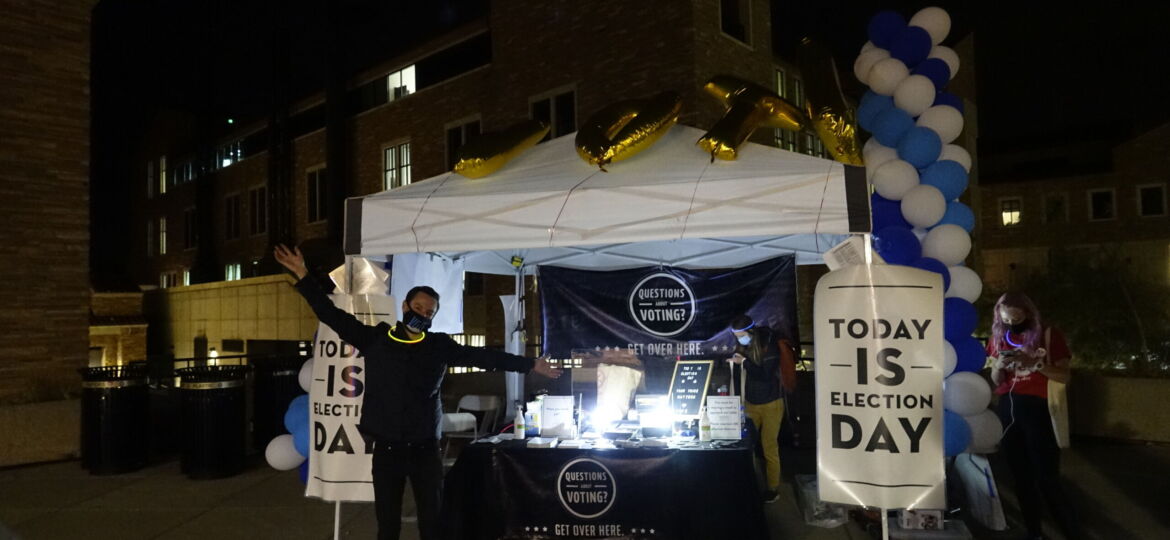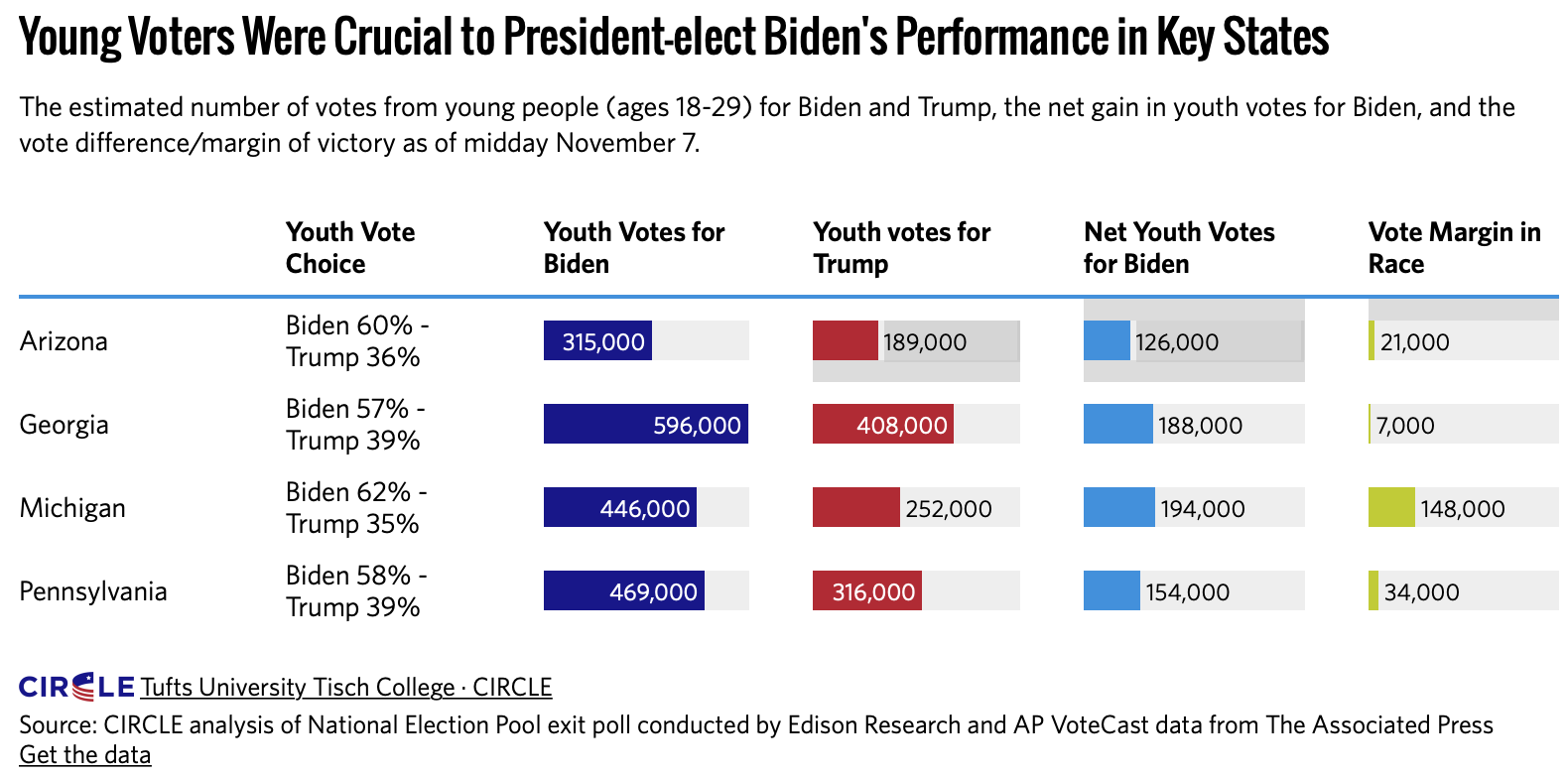
Youth voters turn out in record numbers
Disclosure Statement: This article was written for JRNL 4874 in fall 2020. This article was completed on Dec. 11, 2020 before the CU Student Government Tri-Executive Transform ticket formed, which includes the author Hannah Prince and Leeds School of Business senator Mia Rodriguez. The article was scheduled to be promoted on social media the week before Inauguration Day, in reflection of the youth vote.
Editor’s Note: It’s 2018, a midterm year. As I walk across campus from my dorm to my first class at the University of Colorado Boulder, the sidewalks are bustling with student groups advocating for their causes and spreading their mission. Among those groups is New Era Colorado, which is one of the most effective youth civic engagement organizations in the country and their staff consists of many CU students. A young man crosses the sidewalk to speak to me. As a shy freshman, I have my headphones on trying to ignore strangers at all costs, but his enthusiasm and confidence intrigue me, and I politely stop to listen to the pitch. He explains he works for New Era Colorado and asks if I am registered to vote. I respond, “Yes, I am registered in California, my home state.” That response elicits even more excitement, and he gives me a pamphlet to give to my friends in the dorm, outlining information on how to register, where to research issues and candidates and more. Up until this moment, I did not realize how someone so young could be ecstatic about politics… of all topics. Voting was a privilege and responsibility in my eyes, but never something fun. How could it be?
Now, two years later with many journalism and political science courses under my belt, I understand his excitement. For me, the ability to receive an education and accessibility of that education influenced my interest and participation. Everywhere we look, life is filled with the decisions made by politicians and institutions – the streets we drive on, the water we drink, the laws we abide by. Though 2020 was a year filled with turmoil, exhaustion and unprecedented events, it has brought to light the deficiencies in our democracy. From covering Boulder City Council for a semester to editing the politics beat at The Bold, I am hopeful for the future of politics. The time for change is now, and our generation knows our voice is our vote. Our generation answered the call to fight for justice and equity. Youth turned to social media and protest; they became advocates for pressing issues, challenging the status quo and older generations.
—–
In the years leading up to becoming an eligible voter, Asa Forest from Weston, Conn., was introduced to different political systems, as his mother is a British citizen, and his father is an American citizen. Forest credits his view of democracy and ability to be critical of both political parties to his father, who identifies as an independent.
In 2018, Forest registered to vote in Colorado, and 2020 was his first time voting in a presidential election. As a media studies student at the University of Colorado Boulder, Forest explores dissemination of news and what constitutes fact versus fiction.
“I think our generation did a lot in getting information out there through social media and using that to our advantage,” said Forest. “It is an entirely new way of listening to politics.”
According to CIRCLE, data suggest 52% to 55% of eligible voters in the 18-29 age group cast a ballot in the 2020 presidential election, compared to 42% to 44% in 2016. Additionally, Colorado youth became the largest voting bloc in the state, casting 27% of all ballots.
Jessie Bart from Estes Park, Colo., said she had a responsibility to do something, and that something was her vote.
“We saw that every single vote really does matter,” she said, especially in key battleground states. Younger voters preferred Biden by a 25-point margin, which led to a significant impact in battleground states like Michigan, Georgia, Arizona and Pennsylvania.

While younger voters often lean Democratic, Bart said her friends “are pretty moderate. Their parents are conservative, but they are in the middle. But they saw what was going on this year with Trump and all voted for Biden. I think Biden’s support of social causes meant a lot to our generation.”
Jayk Rosinski from Chicago, Ill., sees things different, and argues that young people are overly influenced by Democratic ideologies from what they see on social media, including fear around “cancel culture.” One of the major issues that drove Rosinski to the polls is the massive spike in social media’s presence.
“I feel like as people bury themselves in their technology, it gives the government the unique ability to fill people’s heads with some false information,” said Rosinski in an interview via email. “People begin to follow this and use it to gain support of people who have the same core beliefs. I think we need someone in office who will respect the people’s freedom and keep America’s ‘dominant’ presence in the world. I believe this person is the current president, Donald Trump.”
With an increase in polarization in recent years, party allegiance seems to become a divisive factor. Yet data shows young people are more likely to decide late on candidates in an election season because of their lack of familiarity with the system, in contrast to older generations who have been voting for years.
“2020 could turn out to be a landmark election because of the pandemic and we have had such an unusual president,” said CU Boulder journalism professor Michael McDevitt. “Political scientists talk about how there can be events that are really significant within in a young person’s life that can – it doesn’t determine whether a youth will be a Democrat or Republican or Libertarian or something else – but it can be very impressionable for youth because they are not yet locked into their partisan allegiance.”
As a first-time voter, Mia Rodriguez from Boulder, Colo., said she is inspired by peers who break away from their family’s political ideologies. She believes an openness of diverging opinions can lead to a lot of social change in younger generations. Rodriguez grew up in a conservative family, yet feels their viewpoints pushed her in the opposite direction, describing herself as very liberal and leaning socialist.
Issues surrounding the Black Lives Matter movement and COVID-19 pandemic drove Rodriguez to the polls.
Like Rodriguez, other young adults in college between the age of 18-23, said the pandemic made them realize political leaders’ decisions impacted their everyday lives as reported in a recent CIRCLE report on Gen Z. Top issues for young Democratic voters were the coronavirus (42%), racism (21%) and climate change (12%). Top issues for young Republican voters were the economy/jobs (41%) and abortion (9%), according to CIRCLE data.
“I think for people who grow up in a family who is extremely conservative or liberal, it can be hard to break away from that and have their own opinions,” said Rodriguez, adding, “I think you should be extremely proud of who you are voting for and not keep it a secret. With the new youth that is coming up, I think we have a lot of progressive ideologies overall and I want to see that reflected in our country.”
Gen Z is the most diverse demographic – racially and ethnically – in the entire United States, which factors into voter preference. People in Gen Z, which includes those born between 1997 and 2012, are also considered digital natives, which is reflective in their taking to social media platforms, like Instagram, Twitter and TikTok, to voice their political opinions and beliefs. From Rodriguez’s personal experience, her social media became a source for political activism from sharing memes to matters of deeper, serious nature.
Political science PhD Pavel Bacovsky of CU Boulder studies political behavior in the era of new communication technologies, especially how virtual hobbies affect behaviors and how Gen Z and Millennials use social media as a political platform.
“Young people will continue to engage in environments that they are comfortable with,” Bacovsky said. “One thing we need to accept is that technology is becoming more and more prevalent.”
New Era Colorado recognized these trends on social platforms and increased their digital outreach in 2020.
“We see pretty clearly that young people care. It is not apathy that prevents young people from voting, it is access,” said Mike Carter, communications manager at New Era Colorado.
Access to information about how to register and vote intersects with age, race and level of education. But that information is often not readily available to non-college educated and minority communities, which decreases their level of political participation. For example, a 2016 CIRCLE study shows Black youth had less information about absentee voting. This also opens up more opportunities for voter suppression.
To combat voter suppression and current restrictions on minority voters, New Era Colorado continues to work on pro-voter laws to further accessibility. In 2019, the Colorado Votes Act was amended and included changes to procedures for voter registration, including registration on Native American reservations, and ballot access requirements among other modifications.
“You should vote, but you shouldn’t stop engaging after Election Day,” said Carter, because democracy is an ongoing challenge.

